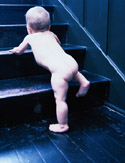Here's To Life!

Faced with her own astonishing baby girl, writer Lorene Cary was finally able to conceive of mystery, calm and beauty.
The week after my first daughter was born, nearly 17 years ago, I took her to visit my grandparents. When I was a girl, I spent weekends with them; now a married woman, I still drove over the Delaware River from Philadelphia to New Jersey to spend an afternoon and evening with them and my father once a week. Like phone calls in the morning to my mother and twice—or thrice—yearly trips to see my in-laws, these visits gave rhythm and ballast to the year. At my grandparents' house, we ran through our repertoire: nurse, burp, diaper, sporadic eye contact. She nursed fast and spit up regularly, as I had done with my mother. We praised her gusto and commended her natural overflow valve. Her staccato ah-ah-ah charged the air in the quiet pink-and-green house. What a fine baby. I swaddled her in a new blue, too-big baby zip-bag sleeper, fastened it with a diaper pin—because she liked close pressure around her body—and put her down for her final trick, milk-induced oblivion. Excellent sleeper. Nana directed me to the end of the couch where my sister had napped, in the same relative position in which I'd been laid for rests on the old couch. We propped pillows and stood staring."Just think, honey," Nana said, "last week you were still pregnant."
For a moment I couldn't take it in. Now a baby girl lay sleeping among us. Last week there had been no such person, making grown-ups prop pillows and move furniture, compelling us to conjure old stories and open sores of the psyche. Just a few days before, I had been gravid, unable to bend, swollen with fluid, moving, eating, breathing, eliminating for two. Now I was alone again, but with less illusion of control, in a shrinking, lactating body: mother-morph, supple. Before then I'd learned that death inhered in life, silent but active—from dead rats that stank and dried in the street to boys who fought in gangs and men in Vietnam; a great-grandmother who cooked fish until you could chew the bones; a great-grandfather whose voice still resonates in my head. And I was an asthmatic child. I knew that life could be squeezed out of my narrow chest as a car sped me to the hospital. Death could take you in a breath.
But I had not known with the same certainty that life itself lay imbedded in each shiny moment. I had not known the mystery of how lightning changed amino acids into cells or of spontaneous healing—forgiveness where once there was anger and hate. I had sung Handel's Messiah and loved the music, but had not dared hope that in my own flesh I would see the divine. A recovered asthmatic, I could breathe, but not yet deeply, not into each cell. I was, I am, we are all destined to die—but just as surely to participate in this moment, in creation.
The week before, I'd been pregnant. Now someone new and beautiful lay on the couch, dreaming new dreams all her own. It gave me hope where I hadn't known I was hopeless.



